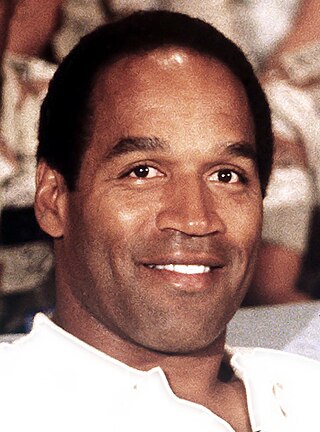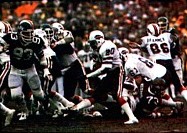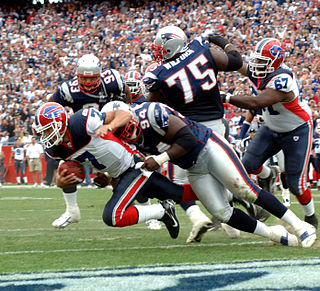
The 1989 Cleveland Browns season was the team's 40th season with the National Football League.
The 1972 Cleveland Browns season was the team's 23rd season with the National Football League. The Browns finished at 10–4 which qualified the team for the NFL Playoffs as a Wild Card. In the Divisional Playoffs they played the undefeated Miami Dolphins and held a one-point lead in the 4th quarter. But a late Dolphins touchdown put them up for good, and the Browns lost 20–14.

The Electric Company were the offensive line of the Buffalo Bills during the mid-1970s that helped running back O. J. Simpson establish numerous National Football League (NFL) all-time records and earn numerous statistical titles. The nickname is sometimes more loosely used to refer to the Electric Company Offense for the Bills offensive unit or the Electric Company Buffalo Bills for the teams of this era.
The 1973 Miami Dolphins season was the franchise's eighth season and fourth season in the National Football League (NFL). The team entered the 1973 season as defending Super Bowl champion following its perfect undefeated 1972 season.
The 1965 Buffalo Bills season was the team's sixth season in the American Football League. Though not as statistically dominant as the previous season, the Bills won a second consecutive league championship.
The 1973 Buffalo Bills season was the 14th season for the team and their 4th season in the National Football League (NFL). The Bills finished in 2nd place in the AFC East division and finished the 1973 NFL season with a record of 9–5, the team's first winning record since 1966.
The 1969 Buffalo Bills season was the team’s tenth season, and was the final season of the American Football League before the 1970 AFL-NFL Merger. The Bills played an AFL-record seven games against opponents that went on to reach the postseason; Buffalo lost all seven of these games.
The 1980 Buffalo Bills season was the franchise's 11th season in the National Football League, and the 21st overall. Their 11–5 record was tied for best in the AFC.
The 1968 Buffalo Bills season was the team’s ninth season.
The 1975 Buffalo Bills season was the franchise's sixth season in the NFL, and its 16th overall. The Bills failed to improve on their 9–5 record from last year and finished 8–6. They enjoyed their third consecutive winning season, but they still failed to qualify for the playoffs for the first time since 1973.
The 1970 Buffalo Bills season was the franchise's first season in the National Football League, and eleventh overall. The team looked to improve on its 4–10 record from 1969 and make the playoffs for the first time since 1966. However, the Bills started out on the wrong foot, losing four of their first five games. After winning two consecutive road games against the Patriots and Jets and suffering a blowout loss to the Cincinnati Bengals, the Bills and Colts played to a 17–17 draw in week 9, Buffalo's first tie since 1968. The Bills would then lose five straight to end the season and finished 3–10–1, for fourth place in the AFC East. Their Week 5 game against the Miami Dolphins would start an era of futility during which the Bills would lose twenty consecutive games against the Dolphins. The Bills would not defeat the Dolphins at any point during the 1970s and next beat Miami in 1980. This would become known as "The Streak".
The 1985 Buffalo Bills season was the franchise's 16th season in the National Football League, and the 26th overall. It was Buffalo's second-consecutive 2–14 season. Head coach Kay Stephenson was fired after an 0–4 start. Defensive coordinator Hank Bullough took over, going 2–10 for the remainder of the season. For the second consecutive season, the Bills went winless on the road.
The 1972 Buffalo Bills season was the franchise’s third season in the National Football League, and thirteenth overall. It was also their last season at War Memorial Stadium which had been their home field since the franchise started in 1960.
The 1978 Buffalo Bills season was the franchise's 9th season in the National Football League, and the 19th overall. The Bills were coming off a season in which they only won three games, making 1978 a slight improvement.
The 1979 Buffalo Bills season was the franchise's 10th season in the National Football League, and 20th overall.

The 1981 Buffalo Bills season was the franchise's 12th season in the National Football League, and the 22nd overall.
The 1976 Buffalo Bills season was the franchise's 7th season in the National Football League, and the 17th overall.
The 1982 Buffalo Bills season was the franchise's 13th season in the National Football League, and the 23rd overall. Due to the 1982 NFL strike, the season was shortened to only nine games; the Bills' 4–5 record left them in the 9th spot in the AFC, therefore eliminating the Bills from the playoffs in the 16-team tournament format.
The 1977 Buffalo Bills season was the franchise's 18th season, and their eighth in the National Football League. The team posted a losing record for the second-consecutive season, and missed the postseason for the third season.

The Bills–Patriots rivalry is a National Football League (NFL) rivalry between the Buffalo Bills and New England Patriots.



